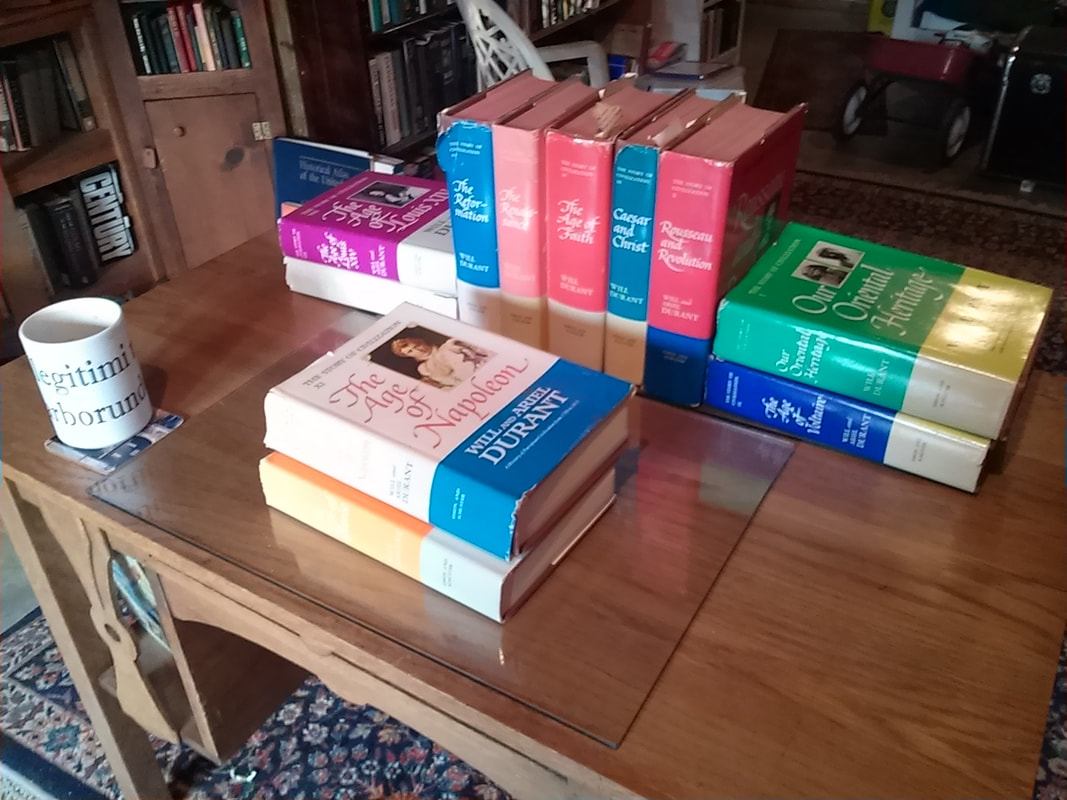One of the delights of reading the Durants’ The Story of Civilization is the wit, some of it unintentional because of the passage of time, some of it as on target as the jabs of a sophisticated comedian.
Here are some samples from The Age of Voltaire.
Durant writes of Voltaire that “All the world knows how the excitable youth fell in love with Olympe Dunoyer.” (Alas, Will, we know no such thing. I’m not even sure how many people nowadays would recognize the name of Voltaire.)
Here are some samples from The Age of Voltaire.
Durant writes of Voltaire that “All the world knows how the excitable youth fell in love with Olympe Dunoyer.” (Alas, Will, we know no such thing. I’m not even sure how many people nowadays would recognize the name of Voltaire.)
Of Olympe’s reaction to Voltaire’s love and the threat of disinheritance that would come from his father if Voltaire pursued that love, Durant writes of Olympe that “Being wiser by two years and one sex, she answered that he had better make his peace with his father and become a good lawyer.”
Of Voltaire: “Doubtless he talked too much, which is the easiest thing in the world.”
Of English gangs in the 18th century, which brought to mind today’s English football fans: “One group, the ‘Mohocks,’ was wont to sally drunk into the streets, prick passers-by with their swords, make women stand on their heads, and gouge the eyes out of unaccommodating victims.”
Of violence and force of will among the English: “A soldier who asked leave to marry an army prostitute was punished with a hundred lashes; he appeared the next day, his back all raw, before the same officer, and repeated his plea; this time it was granted.”
Of female fashion: “Women, when on display, dressed as in our wondering youth, when the female structure was a breathless mystery costly to behold.”
Of English government at the time of Walpole: “In that corrupt age only through corruption could wisdom rule.”
Of English roads and the beliefs of Protestant Dissenters: “Travel was to be avoided on the Sabbath, so allowing the highwaymen a day of rest.”
On the religious writer Joseph Butler (Americans may answer in the affirmative to this question): “…he surprised his friend Dean Tucker by asking might not a nation, as well as an individual, go mad?”
Of the obese philosopher David Hume near the end of his life: “…if his corpulence ruined the chairs, his wit atoned for the weight."
Of Voltaire: “Doubtless he talked too much, which is the easiest thing in the world.”
Of English gangs in the 18th century, which brought to mind today’s English football fans: “One group, the ‘Mohocks,’ was wont to sally drunk into the streets, prick passers-by with their swords, make women stand on their heads, and gouge the eyes out of unaccommodating victims.”
Of violence and force of will among the English: “A soldier who asked leave to marry an army prostitute was punished with a hundred lashes; he appeared the next day, his back all raw, before the same officer, and repeated his plea; this time it was granted.”
Of female fashion: “Women, when on display, dressed as in our wondering youth, when the female structure was a breathless mystery costly to behold.”
Of English government at the time of Walpole: “In that corrupt age only through corruption could wisdom rule.”
Of English roads and the beliefs of Protestant Dissenters: “Travel was to be avoided on the Sabbath, so allowing the highwaymen a day of rest.”
On the religious writer Joseph Butler (Americans may answer in the affirmative to this question): “…he surprised his friend Dean Tucker by asking might not a nation, as well as an individual, go mad?”
Of the obese philosopher David Hume near the end of his life: “…if his corpulence ruined the chairs, his wit atoned for the weight."






 RSS Feed
RSS Feed